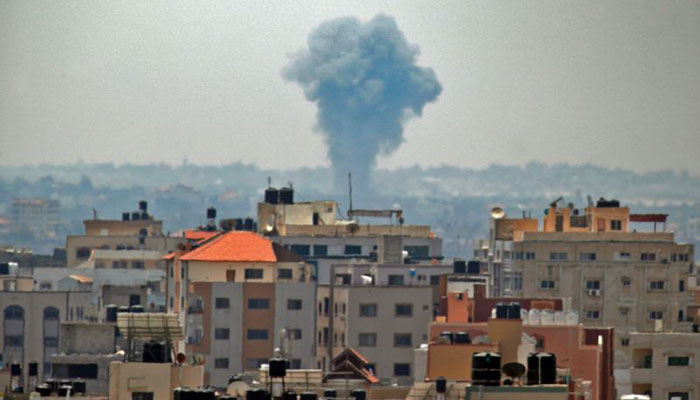Israel hits dozens of Gaza targets after mortar barrage
Israel hits dozens of Gaza targets after mortar barrage


GAZA CITY: Israel said it hit dozens of military targets in Gaza on Tuesday in response to a barrage of mortar and rocket fire from Hamas and allies in the worst flare-up since a 2014 war.
Late Tuesday a spokesman said a ceasefire agreement had been reached to restore calm, though the Israeli army declined to comment on the claim.
Explosions continued until late Tuesday, with the Israeli army reporting sirens being triggered in a number of locations near the border.
Tuesday's exchange of fire came after weeks of deadly unrest along the border between Israel and the blockaded Palestinian enclave.
Three Israeli soldiers were wounded by projectiles fired from Gaza, one moderately and two lightly, said the army. There were no immediate reports of any casualties in the strip.
In a rare joint statement, Hamas and its allies declared shared responsibility for the attacks, saying it was in retaliation for Israeli attacks targeting their positions.
Three members of Hamas's allies were killed in an Israeli strike on Sunday, with the group vowing revenge.
Early Tuesday, some 28 mortar shells were fired toward Israel from the Gaza Strip, with Israel saying most were intercepted by its air defence systems but leaving residents in the area on high alert and remaining close to bomb shelters.
One mortar shell exploded near a kindergarten building, a military spokesman said, causing damage to the structure. No children were present at the time.
It was the largest barrage fired from Gaza targeting Israel since a 2014 war, and Israel's response would also be the biggest since then.
The UN Security Council is expected to meet Wednesday to discuss the attacks on Israel, following a request by the United States for an urgent meeting.
"The Security Council should be outraged and respond to this latest bout of violence directed at innocent Israeli civilians," US ambassador Nikki Haley said.
Kuwait, a non-permanent council member that represents Arab countries, circulated a draft UN Security Council resolution calling "for the consideration of measures to guarantee the safety and protection of the Palestinian civilian population" in the occupied Palestinian territories and the Gaza Strip.
Explosions shake enclave
Prime Minister Benjamin Netanyahu said that the country's army would "respond to these attacks powerfully."
Shortly after he spoke, Israel's military began carrying out air strikes in Gaza. Explosions shook the Palestinian enclave and smoke rose from areas hit.
At least seven Hamas and its allies bases were struck, security sources in Gaza said.
Later in the day, further rockets or mortar rounds were intercepted by Israel from Gaza, the army said. It alleged some of the mortar rounds fired throughout the day were supplied by Iran.
Israel's military said it responded by hitting more than 35 "military targets", including a tunnel that stretched into its territory, weapons storage facilities and militant bases.
Israel's military said it was not seeking an escalation, but warned Hamas, with whom it has fought three wars since 2008.
"They have the ability, the control and the power to escalate or to deescalate the situation, to rein in the Palestinian's and their own extremist factions in Hamas or to escalate the situation," said military spokesman Jonathan Conricus.
Hamas said in a statement "what the resistance carried out this morning comes within the framework of the natural right to defend our people".
"The Israeli occupation bears full responsibility for any upcoming escalation."
Separately in the morning, Palestinians launched boats from Gaza to protest Israel's blockade in what they said would be a peaceful demonstration.
Israeli forces later stopped and seized the main protest boat as it approached the blockade limit at nine nautical miles, while others were said to have turned back.
'Gazans are fed up'
Tuesday's incidents came after weeks of deadly demonstrations and clashes along the Gaza-Israel border, beginning on March 30.
The protests have called for Palestinians who fled or were expelled in the 1948 war surrounding Israel's creation to be allowed to return to their former homes now inside Israel.
They peaked on May 14, when at least 61 Palestinians were killed as tens of thousands of Gazans protested and clashes erupted on the same day of the US transfer of its embassy in Israel from Tel Aviv to Jerusalem.
Demonstrations and clashes have continued at a low level since then. At least 121 Palestinians have been killed by Israeli fire in the unrest.
Israel says its actions are necessary to defend its borders and accuses Hamas of encouraging thousands of Palestinians to break through the border and attack Israelis.
But Israel has faced international criticism and calls for an independent investigation over its use of live fire during the protests and clashes along the border.
No Israelis have been killed.
The Gaza Strip has been under Israeli blockade for more than a decade, with Israel saying it is necessary to prevent Hamas from obtaining means to attack.
No comments